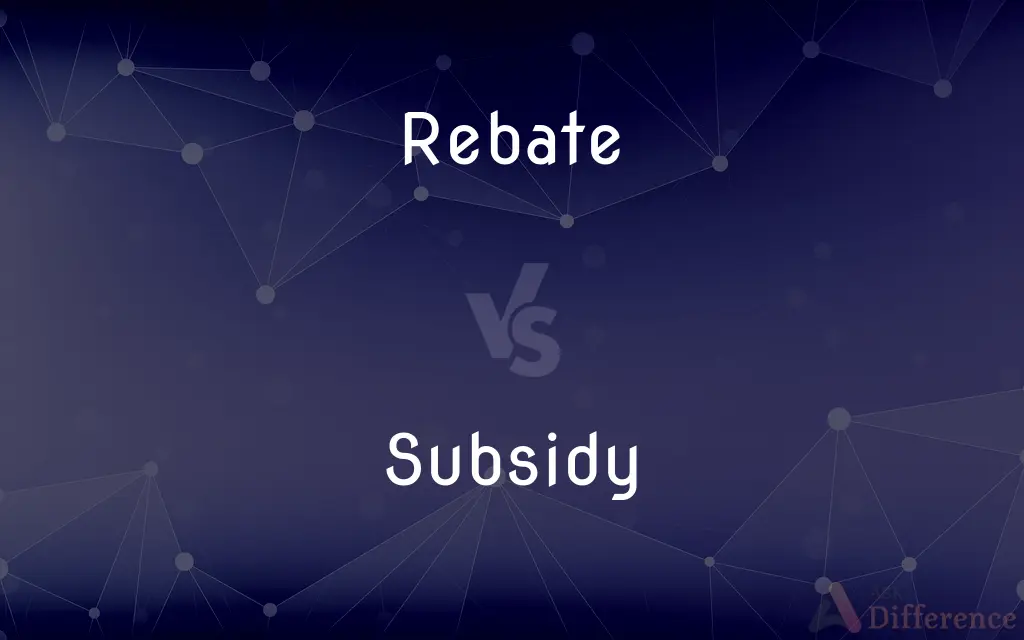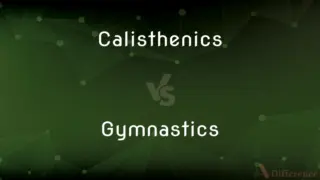Rebate vs. Subsidy — What's the Difference?
By Tayyaba Rehman & Urooj Arif — Updated on March 14, 2024
A rebate is a partial refund to someone who has paid too much for tax, rent, or utility, while a subsidy is a government grant to help reduce the cost of goods and services.

Difference Between Rebate and Subsidy
Table of Contents
ADVERTISEMENT
Key Differences
Rebates are typically offered by manufacturers or retailers as a marketing strategy to encourage purchases or by governments as a way to return excess tax payments. They effectively lower the cost of goods or services after purchase, acting as an incentive for consumers. On the other hand, subsidies are financial support provided mainly by governments to businesses, industries, or consumers, aiming to lower the production costs, stabilize prices, or promote certain economic activities or policies. This distinction highlights rebates as post-purchase price reductions, while subsidies are preemptive financial aids to influence market prices or support sectors.
While rebates can apply to anyone who meets the criteria set by the offering party, subsidies are often targeted towards specific sectors such as agriculture, energy, or public transportation. This targeting is meant to achieve broader economic or social objectives, such as food security, renewable energy adoption, or affordable public services, whereas rebates aim at direct financial benefits to consumers or incentivizing certain behaviors.
Rebates usually require the recipient to take some action, such as submitting a claim form after purchase, to receive the refund. This process ensures that the rebate only benefits those who have engaged in a specific transaction. Subsidies, however, generally do not require such actions from the end consumers; instead, they are directly applied to the production or supply chain to reduce the overall market price of the subsidized goods or services.
The impact of rebates is often immediate and tangible to the consumer, reflecting as a direct reduction in the net cost of a purchased item. Conversely, the effects of subsidies might be broader and less directly perceptible to consumers, as they can lead to overall lower prices, increased availability of subsidized goods, or the sustainability of services and industries deemed vital by the government.
Rebates and subsidies also differ in their duration and consistency. Rebates are usually offered for a limited time or until certain conditions are met, such as a final line or a cap on the amount refunded. Subsidies, however, can be more long-term, reflecting ongoing government policy priorities or economic strategies aimed at maintaining or altering market dynamics over a longer period.
ADVERTISEMENT
Comparison Chart
Definition
Partial refund after purchase
Government grant to reduce production costs
Primary Purpose
Encourage purchases or return excess payments
Support sectors, stabilize prices, promote policies
Target
Consumers, taxpayers
Industries, sectors, businesses
Requirement
Submission of a claim form
None for consumers, policy compliance for businesses
Impact
Immediate price reduction for consumers
Broad market effects, lower production costs
Duration
Limited time, specific conditions
Can be long-term, depending on government policy
Compare with Definitions
Rebate
Partial refund for overpayment.
He received a tax rebate for overpaid taxes.
Subsidy
Financial aid to reduce costs.
Farmers received a subsidy to support crop prices.
Rebate
Often time-bound.
The rebate offer expires at the end of the month.
Subsidy
Reflects policy priorities.
Housing subsidies help ensure affordable housing options.
Rebate
Encourages consumer behavior.
Energy rebates incentivize energy-efficient purchases.
Subsidy
Promotes specific industries.
Renewable energy projects benefit from government subsidies.
Rebate
Claimed after purchase.
She submitted a rebate form to get money back on her new laptop.
Subsidy
Stabilizes or lowers market prices.
Subsidies keep public transport fares affordable.
Rebate
Marketing tool to boost sales.
The store offered a rebate on early purchases.
Subsidy
Directly supports production.
The film industry's growth was aided by production subsidies.
Rebate
A deduction from an amount to be paid or a return of part of an amount given in payment.
Subsidy
A subsidy or government incentive is a form of financial aid or support extended to an economic sector (business, or individual) generally with the aim of promoting economic and social policy. Although commonly extended from the government, the term subsidy can relate to any type of support – for example from NGOs or as implicit subsidies.
Rebate
Variant of rabbet.
Subsidy
Monetary assistance granted by a government to a person or group in support of an enterprise regarded as being in the public interest.
Rebate
A cut or groove along or near the edge of a piece of wood that allows another piece to fit into it to form a joint.
Subsidy
Financial assistance given by one person or government to another.
Rebate
A joint so made.
Subsidy
Money formerly granted to the British Crown by Parliament.
Rebate
To deduct or return (an amount) from a payment or bill.
Subsidy
Financial support or assistance, such as a grant.
Manufacturing firms are supported by government subsidies in some countries.
Rebate
To lessen; diminish.
Subsidy
(dated) Money granted by parliament to the British Crown.
Rebate
To cut a rabbet in.
Subsidy
Support; aid; coöperation; esp., extraordinary aid in money rendered to the sovereign or to a friendly power.
They advised the king to send speedy aids, and with much alacrity granted a great rate of subsidy.
Rebate
To join by a rabbet.
Subsidy
Specifically: A sum of money paid by one sovereign or nation to another to purchase the coöperation or the neutrality of such sovereign or nation in war.
Rebate
To be joined by a rabbet.
Subsidy
A grant from the government, from a municipal corporation, or the like, to a private person or company to assist the establishment or support of an enterprise deemed advantageous to the public; a subvention; as, a subsidy to the owners of a line of ocean steamships.
Rebate
A deduction from an amount that is paid; an abatement.
Subsidy
A grant paid by a government to an enterprise that benefits the public;
A subsidy for research in artificial intelligence
Rebate
The return of part of an amount already paid.
Rebate
(photography) The edge of a roll of film, from which no image can be developed.
Rebate
A rectangular groove made to hold two pieces (of wood etc) together; a rabbet.
Rebate
A piece of wood hafted into a long stick, and serving to beat out mortar.
Rebate
An iron tool sharpened something like a chisel, and used for dressing and polishing wood.
Rebate
A kind of hard freestone used in making pavements.
Rebate
(transitive) To deduct or return an amount from a bill or payment
Rebate
(transitive) To diminish or lessen something
Rebate
To beat to obtuseness; to deprive of keenness; to blunt; to turn back the point of, as a lance used for exercise.
Rebate
(transitive) To cut a rebate (or rabbet) in something
Rebate
To abate; to withdraw.
Rebate
To beat to obtuseness; to deprive of keenness; to blunt; to turn back the point of, as a lance used for exercise.
But doth rebate and blunt his natural edge.
Rebate
To deduct from; to make a discount from, as interest due, or customs duties.
Rebate
To return a portion of a sum paid, as a method of discounting of prices.
Rebate
To abate; to withdraw.
Rebate
Diminution.
Rebate
Deduction; abatement; as, a rebate of interest for immediate payment; a rebate of importation duties.
Rebate
A portion of a sum paid, returned to the purchaser, as a method of discounting. The rebate is sometimes returned by the manufacturer, after the full price is paid to the retailer by the purchaser.
Rebate
A rectangular longitudinal recess or groove, cut in the corner or edge of any body; a rabbet. See Rabbet.
Rebate
A piece of wood hafted into a long stick, and serving to beat out mortar.
Rebate
An iron tool sharpened something like a chisel, and used for dressing and polishing wood.
Rebate
A kind of hard freestone used in making pavements.
Rebate
A refund of some fraction of the amount paid
Rebate
A rectangular groove made to hold two pieces together
Rebate
Give a reduction in the price during a sale;
The store is rebating refrigerators this week
Rebate
Cut a rebate in (timber or stone)
Rebate
Join with a rebate;
Rebate the pieces of timber and stone
Common Curiosities
How does a subsidy work?
A subsidy is a financial contribution from the government to businesses or sectors to lower the cost of goods and services, support economic activities, or achieve policy goals.
What is a rebate?
A rebate is a partial refund given to purchasers of goods or services, often as a promotion or to correct overpayment.
How do rebates benefit consumers?
Rebates benefit consumers by providing a partial refund on their purchases, effectively reducing the overall cost of the goods or services bought.
What is the impact of subsidies on an economy?
Subsidies can encourage the growth of specific sectors, stabilize prices, and promote policy objectives, but they can also lead to budgetary burdens and market imbalances.
Can individuals receive subsidies?
While subsidies are primarily aimed at industries or sectors, individuals can indirectly benefit through lower prices or specific programs like housing subsidies.
Can a subsidy affect market competition?
Yes, subsidies can influence market competition by making subsidized goods or services cheaper than those from unsubsidized competitors, potentially leading to market distortions.
What role do rebates play in marketing?
Rebates are used as a marketing strategy to temporarily lower the price of goods and services, making them more attractive to consumers without a permanent price reduction.
Can subsidies lead to dependency?
Yes, long-term subsidies can create dependency, where businesses or sectors rely on government support rather than improving efficiency or competitiveness.
Why do companies offer rebates?
Companies offer rebates to encourage purchases, promote new products, or make their offerings more attractive by effectively lowering the price after purchase.
What are the common forms of subsidies?
Common forms include direct financial support, tax breaks, price controls, and grants for research or development.
Is a rebate the same as a discount?
No, a rebate is a refund given after a purchase has been made, while a discount reduces the purchase price at the point of sale.
Are rebates only offered by businesses?
No, governments can also offer rebates, such as tax rebates to taxpayers who have overpaid their taxes.
Are there any downsides to rebates?
The need to submit claims and wait for refunds can deter some consumers, making rebates less immediately impactful than discounts.
How do subsidies support sustainable development?
Subsidies can support sustainable development by promoting green technologies, renewable energy, and environmentally friendly practices through financial incentives.
Why might a government choose to subsidize an industry?
Governments might subsidize an industry to promote economic growth, ensure the availability of essential services, or achieve social policy objectives like job creation or environmental protection.
Share Your Discovery

Previous Comparison
Calisthenics vs. Gymnastics
Next Comparison
Ambition vs. PrideAuthor Spotlight
Written by
Tayyaba RehmanTayyaba Rehman is a distinguished writer, currently serving as a primary contributor to askdifference.com. As a researcher in semantics and etymology, Tayyaba's passion for the complexity of languages and their distinctions has found a perfect home on the platform. Tayyaba delves into the intricacies of language, distinguishing between commonly confused words and phrases, thereby providing clarity for readers worldwide.
Co-written by
Urooj ArifUrooj is a skilled content writer at Ask Difference, known for her exceptional ability to simplify complex topics into engaging and informative content. With a passion for research and a flair for clear, concise writing, she consistently delivers articles that resonate with our diverse audience.














































